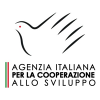Much like in the other countries of Sahel, even in Mali chronic food insecurity keeps being a serious problem. The nutritional crisis requires a quick answer, as people affected by it are estimated to be 3,6 million.
This happens especially in the Sègou Region, in the centre of the country, where food insecurity and malnutrition have been worsened by the 2012 political crisis and the following conflict (still ongoing), which have negatively impacted the functioning, efficiency and quality of the National Health System and its facilities.
COOPI works with local health professionals to reduce morbility and mortality related to acute child malnutrition by improving the access to and the quality of prevention services for children between 6 and 59 months of age, estimated at 104,000 potential beneficiaries.
One of the goals set by the project is the integration of such “good practices” in the Minimum Package of Activities for acute malnutrition management in the Regional Sanitation District.
Furthermore, proper child feeding and nutrition is planned to be taught to 23,000 pregnant women, as they are the ones usually in charge of such tasks in family contexts. The teachings will be held in both qualified health centres and support groups; their purpose is to provide parents and caregivers with the required tools to become independent in child care and detection of potential malnutrition.
